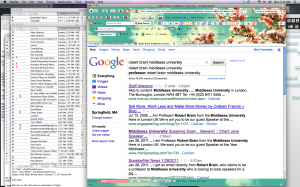Should You Work with a Company That Doesn’t Share Your Values? My Take
It’s been a great discussion the past few days about whether and when it makes sense to work with companies that don’t share your values. I promised to add my own views after we’d gotten some comments, and thus, this post—which I wrote before receiving any of the comments, but chose to hold back on posting:
Here’s my take, as a long-time peace/environmental activist who also writes about how to leverage social change through business. You have these options:
1. Be a purist and refuse any tainted money or tainted partnerships, defining taint to mean that the company is in some way involved in things you disagree with.
2. “Separation of powers,” where you will work with a company that has dirty hands, but only work on the clean-hands aspects of that company.
3. Use the partnership to actively push the company toward more progressive stances, and eventually to abandon the actions that caused you to look askance in the first place.
I’ve evolved on this issue over time. In the 70s, I’m pretty sure I’d have been a #1. And been out in the streets with the protestors. But that was before I saw how the business world can not only change itself, but become a fulcrum for change in the wider society. These days, I’m at least a #2 and when possible, a #3. I’m even in dialogue with an outfit that does seminars for utility companies—and I told them I would not assist with anything that promoted nuclear (and if they hire me to present, I will definitely be using my bully pulpit to push the #3-style agenda to the utilities attending the conference).
But I do think there might be companies (or governments) whose philosophy is so opposed to mine that I would still be a number 1, still refuse to get my hands dirty.
I also recognize that sustainability is a path, and we are all somewhere on the path. I am not sure you could find a person who is living 100% sustainably. Even my very self-sufficient 90-year-old friend who lives in a mountaintop cabin she and her late husband built themselves, with no electricity or running water, grows most of her own food, and keeps her income below the taxable level—creates carbon emissions with her woodstove.
I think a great example is Walmart. I don’t choose to shop there, because I oppose its policies on labor issues, community development impact, predatory pricing, and a host of other areas. At the same time, I have publicly lauded Walmart, many times, for its groundbreaking, deep, systemic attention to sustainability. And I point out that Walmart is not a company of tree-huggers, but of executives looking to maximize profit. I’m willing to publicly praise Walmart’s ability make and save boatloads of money through enormous initiatives to use less energy and to introduce organic foods/green products to customers who would *never* set foot in a Whole Foods–even while choosing to put my own shopping dollars elsewhere.
I discuss this kind of conundrum a bit in my latest book, Guerrilla Marketing Goes Green.

